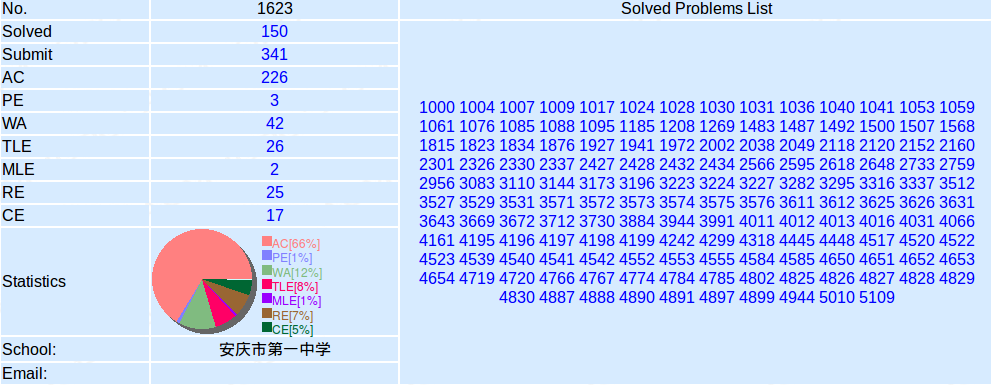1500: [NOI2005]维修数列
Time Limit: 10 Sec Memory Limit: 64 MB
Submit: 16266 Solved: 5410
[Submit][Status][Discuss]Description
请写一个程序,要求维护一个数列,支持以下 6 种操作:请注意,格式栏 中的下划线‘ _ ’表示实际输入文件中的空格Input
输入的第1 行包含两个数N 和M(M ≤20 000),N 表示初始时数列中数的个数,M表示要进行的操作数目。
第2行包含N个数字,描述初始时的数列。
以下M行,每行一条命令,格式参见问题描述中的表格。
任何时刻数列中最多含有500 000个数,数列中任何一个数字均在[-1 000, 1 000]内。
插入的数字总数不超过4 000 000个,输入文件大小不超过20MBytes。Output
对于输入数据中的GET-SUM和MAX-SUM操作,向输出文件依次打印结果,每个答案(数字)占一行。
Sample Input
9 8
2 -6 3 5 1 -5 -3 6 3
GET-SUM 5 4
MAX-SUM
INSERT 8 3 -5 7 2
DELETE 12 1
MAKE-SAME 3 3 2
REVERSE 3 6
GET-SUM 5 4
MAX-SUMSample Output
-1
10
1
10HINT
Source
[Submit][Status][Discuss]
战胜恐惧去写就行了,没什么难的,不过是板子题。
主要问题就是如果模板不是非常熟练的话,几乎不可能在写代码之前将所有问题都考虑清楚,这就需要gdb和输出调试的能力,一个datamaker和一个网上的标程对拍还是比较有效的。有几个需要注意的问题:
1. cov标记只存0和1,不要存具体应该下放的数。因为MAKE-SAME的数可能为0,而v[x]本身存的就是需要下放的数。
2. 垃圾要回收,用栈就可以了,这题不卡时间和空间,可以放心的写。
3. 这题MAX-SUM要求至少包含一个数(也就是这个区间全为负数的时候不能输出0),mx[]存的是至少包含一个数的最大区间和,mxl[]和mxr[]存的是靠左/右的连续一段的最大和(可以为0)。这样就需要mx[0]=-inf
4. 多push()和upd(),其余细节考虑清楚就可以了
写了一个小时,调了三个小时。
BZOJ 150T 留念

1 #include<cstdio>
2 #include<algorithm>
3 #include<iostream>
4 #define rep(i,l,r) for (int i=l; i<=r; i++)
5 using namespace std;
6
7 const int N=1000100,inf=1000000000;
8 int n,m,pos,tot,rt,top,k,nd,f[N],sz[N],v[N],sm[N],mxl[N],mxr[N],mx[N],ch[N][2],stk[N],C[N],R[N],a[N];
9 char op[20];
10
11 int get(){ int x; if (top) return x=stk[top--]; return ++nd; }
12 void thr(int x){ f[x]=v[x]=sm[x]=mxl[x]=mxr[x]=mx[x]=ch[x][0]=ch[x][1]=0; stk[++top]=x; }
13
14 void cov(int x,int k){
15 sm[x]=sz[x]*k; v[x]=k;
16 mxl[x]=mxr[x]=(k>0)?sm[x]:0; mx[x]=(k>0)?sm[x]:k;
17 C[x]=1;
18 }
19
20 void rev(int x){ swap(ch[x][0],ch[x][1]); swap(mxl[x],mxr[x]); R[x]^=1; }
21
22 void push(int x){
23 if (C[x]){
24 if (ch[x][0]) cov(ch[x][0],v[x]);
25 if (ch[x][1]) cov(ch[x][1],v[x]); C[x]=0;
26 }
27 if (R[x]){
28 if (ch[x][0]) rev(ch[x][0]);
29 if (ch[x][1]) rev(ch[x][1]); R[x]=0;
30 }
31 }
32
33 void upd(int x){
34 int ls=ch[x][0],rs=ch[x][1];
35 sz[x]=sz[ls]+sz[rs]+1; sm[x]=sm[ls]+sm[rs]+v[x];
36 mx[x]=max(max(mx[ls],mx[rs]),mxr[ls]+mxl[rs]+v[x]);
37 mxl[x]=max(mxl[ls],sm[ls]+mxl[rs]+v[x]);
38 mxr[x]=max(mxr[rs],sm[rs]+mxr[ls]+v[x]);
39 }
40
41 int build(int l,int r){
42 int mid=(l+r)>>1;
43 int x=get(); v[x]=sm[x]=mx[x]=a[mid];
44 mxl[x]=mxr[x]=(a[mid]>0)?a[mid]:0;
45 if (l<mid) f[ch[x][0]=build(l,mid-1)]=x;
46 if (mid<r) f[ch[x][1]=build(mid+1,r)]=x;
47 upd(x); return x;
48 }
49
50 void rot(int &rt,int x){
51 int y=f[x],z=f[y],w=ch[y][1]==x;
52 if (y==rt) rt=x; else ch[z][ch[z][1]==y]=x;
53 f[x]=z; f[y]=x; f[ch[x][w^1]]=y;
54 ch[y][w]=ch[x][w^1]; ch[x][w^1]=y; upd(y);
55 }
56
57 void splay(int &rt,int x){
58 while (x!=rt){
59 int y=f[x],z=f[y];
60 if (y!=rt){ if ((ch[z][0]==y)^(ch[y][0]==x)) rot(rt,x); else rot(rt,y); }
61 rot(rt,x);
62 }
63 upd(x);
64 }
65
66 int find(int x,int k){
67 push(x);
68 if (sz[ch[x][0]]+1==k) return x;
69 if (k<=sz[ch[x][0]]) return find(ch[x][0],k);
70 else return find(ch[x][1],k-sz[ch[x][0]]-1);
71 }
72
73 void ins(int pos,int p){
74 int x=find(rt,pos),y=find(rt,pos+1);
75 splay(rt,x); splay(ch[rt][1],y);
76 ch[y][0]=p; f[p]=y; upd(y); upd(x);
77 }
78
79 void era(int x){
80 push(x);
81 if (ch[x][0]) era(ch[x][0]);
82 if (ch[x][1]) era(ch[x][1]);
83 thr(x);
84 }
85
86 int split(int x,int y){
87 x=find(rt,x); y=find(rt,y); splay(rt,x); splay(ch[x][1],y);
88 push(ch[y][0]); return ch[y][0];
89 }
90
91 void del(int x,int y){
92 x=find(rt,x); y=find(rt,y); splay(rt,x); splay(ch[x][1],y);
93 era(ch[y][0]); ch[y][0]=0; upd(y); upd(x);
94 }
95
96 int main(){
97 freopen("bzoj1500.in","r",stdin);
98 freopen("bzoj1500.out","w",stdout);
99 scanf("%d%d",&n,&m); mx[0]=-inf;
100 rep(i,2,n+1) scanf("%d",&a[i]); a[1]=-inf; a[n+2]=inf;
101 rt=build(1,n+2);
102 while (m--){
103 scanf("%s",op);
104 if (op[0]=='I'){
105 scanf("%d%d",&pos,&tot); rep(i,1,tot) scanf("%d",&a[i]);
106 int x=build(1,tot); ins(pos+1,x);
107 }
108 if (op[0]=='D') scanf("%d%d",&pos,&tot),del(pos,pos+tot+1);
109 if (op[0]=='M' && op[2]=='K') scanf("%d%d%d",&pos,&tot,&k),cov(split(pos,pos+tot+1),k);
110 if (op[0]=='R') scanf("%d%d",&pos,&tot),rev(split(pos,pos+tot+1));
111 if (op[0]=='G') scanf("%d%d",&pos,&tot),printf("%d
",sm[split(pos,pos+tot+1)]);
112 if (op[0]=='M' && op[2]=='X') printf("%d
",mx[split(1,sz[rt])]);
113 }
114 return 0;
115 }

